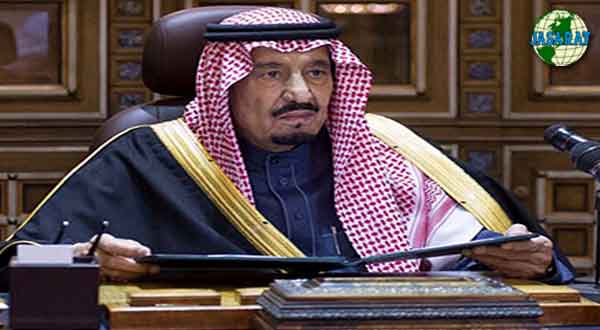WASHINGTON: Newly crowned Saudi King Salman has refused an invitation to attend a landmark summit hosted by President Barack Obama, amid angst over US-Iran nuclear negotiations.
Obama had invited six Gulf kings, emirs and sultans to the presidential retreat at Camp David, seeking to shore up wavering trust while Washington negotiates with regional power Tehran.
Obama’s plans now lie in tatters, with only two heads of state slated to attend the Thursday meeting.
Saudi Arabia’s embassy in Washington said Sunday that recently named Crown Prince Mohammed bin Nayef would instead lead the Saudi delegation to the meeting.
The king’s youthful son, Deputy Crown Prince Mohammed bin Salman — who is tipped as a possible future successor and who has driven recent military operations in Yemen — will also attend.
Saudi Foreign Minister Adel al-Jubeir said Salman would miss the meeting “due to the timing of the summit, the scheduled humanitarian ceasefire in Yemen and the opening of the King Salman Center for Humanitarian Aid,” according to the embassy statement.
Oman’s Sultan Qaboos has been ill, and diplomats said Muscat will be represented by the deputy prime minister.
Abu Dhabi’s Crown Prince Sheikh Mohammed bin Zayed al-Nahayan will attend, according to diplomats, as United Arab Emirates President Sheikh Khalifa bin Zayed al-Nahyan is also unwell and has not appeared in public since having an operation after a stroke last year.
Even before becoming king, Salman was rumored to be ill, and his son and the now crown prince have played oversized roles in Saudi foreign policy. Saudi Arabia has denied the illness.
As late as Friday, US officials said they had expected Salman to come to Washington, before learning of the change in plan.
“This is not in response to any substantive issue,” insisted one senior US administration official.
Bahrain’s King Hamad bin Issa al-Khalifa will also miss the meeting, officials indicated Sunday, with the crown prince coming instead.
That means Obama will likely meet only the leaders of Kuwait and Qatar, despite the prestigious invitation.
The White House had hoped the meeting would assuage deep unease over Iran talks, which Gulf states see as a Faustian bargain, and Obama’s perceived disengagement from the region.
Gulf officials had been pressing for the United States to supply advanced weapons like F-35 stealth fighters as well as a written security guarantee in the face of a threat from Iran.
The Iran nuclear deal — which could be agreed in June — would curb Tehran’s nuclear program in return for unfreezing sanctions and funds worth more than $100 billion.
Gulf states fear that money could be used to by arms and further support Shiite proxy groups in the region.
A US official said a key part of the meetings would be to support a common Gulf defence infrastructure.
“This focus on mutual security extends to various areas — counterterrorism, maritime security, cybersecurity and ballistic missile defense,” the official said.
Washington and the Gulf nations are also expected to discuss conflicts across the Middle East including in Iraq, Libya, Syria and Yemen.
The Obama administration has privately pressed Saudi Arabia to ease an imprecise air campaign on Yemen that appears to have had a limited military impact but caused humanitarian suffering.
More than 1,400 people have been killed since late March in the conflict, according to the United Nations, and 17 aid agencies have a statement calling for an immediate ceasefire.
Riyadh has offered a five-day humanitarian truce from 2000 GMT Tuesday. Yemeni rebels have said they would respond “positively” to ceasefire efforts and their allies accepted a US-backed truce plan.
Salman said the Saudi-led air campaign in Yemen was launched in order to foil a plot by a “sectarian group” to undermine Middle East security and prevent the country from becoming a “theater of terrorism”.
Officials also pointed out that missiles capable of reaching Saudi Arabia fell under the control of Iran-backed Huthi rebels.





